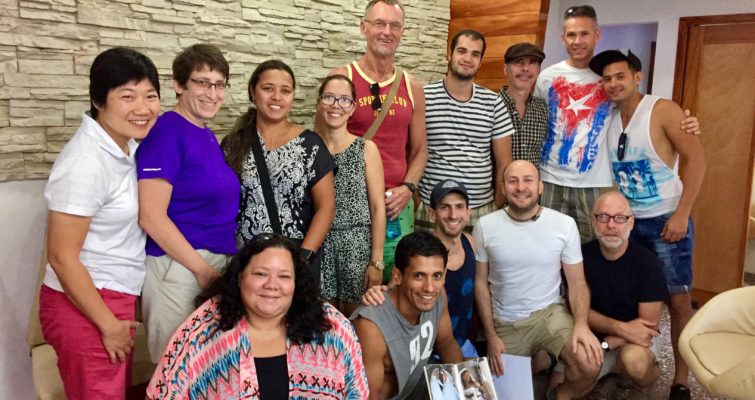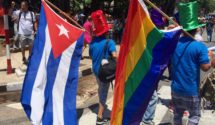
Marriage equality coming to Cuba?
Cuba’s in the middle of revising their Constitution. A draft has been approved by their Parliament, and there’s currently a period of public debate and input. The revisions will supposedly be adopted in November.
In theory, this period of public debate and input represents a chance for the Cuban people to influence the revision. I’ve heard a lot of cynicism about this from Cubans I know, who say that the fix is in. They say this period of debate is just for show… to make people feel involved or to give the process a patina of bottom-up-ness.
To the extent this is really a top-down process, the most visible leader at the top of it is Mariela Castro. Everyone opposed to marriage equality is very upset at her about it. They’re blaming her for forcing her views on all of Cuba, blah blah blah.
Anyways, it’s a big moment for the LGBT community. A Cuban friend just sent me an article about it… and I decided to translate it to English for sharing. The original article is at Engánchate a lo cubano, an online publication I’ve never heard of before.
Anyways, here’s my quick and dirty translation! Enjoy.
(And FYI, the photo at the top of the post is one of my groups with a couple friends of mine, Ely and Mónica. They’re a lesbian couple, and they’re minor celebrities in LGBT Cuba. They were the brides in Cuba’s first same-sex commitment ceremony, an event that sent shockwaves through the community. They’re the two standing side by side, 3rd and 4th from the left. When I have a group interested in LGBT Cuba, sometimes I ask them to hang out with us and tell their story.)
———–
Mariela Castro on gay marriage in Cuba: “I don’t impose or dictate anything, I only promote rights.”
The director of the National Center of Sexual Education (CENESEX) of Cuba, Mariela Castro, daughter of Raúl Castro, affirmed this Friday that she doesn’t impose or dictate “anything,” referring to the debate on the constitutional revision that will open the doors to gay marriage for the island.
“I don’t impose or dictate anything, I only promote rights based on reflection and analysis, based on my social responsibility as director of a scientific institution, whose goals include promoting the sexual rights of all people,” wrote Castro via Twitter.
The draft of the new Cuban Constitution, which is currently in a period of public debate, redefines marriage as “the union between two people with the legal capacity to enter it,” while the current Constitution adopted in 1976 refers to it as the union between a man and a woman.
The EFE press agency signals that, by approving this language, Cuba could eventually enact a law that protects this type of union, responding to one of the principal demands of the island’s LGBT community. In the decade following the triumph of the Castro regime in 1959, Cuba severely persecuted this community.
“The Cuban government has demonstrated its political will to advance a human rights agenda, but backwardness, fanaticism, and dogmatism try to impose and dictate old rules,” published the director [Mariela Castro], who added that she trusts “in the wisdom of the Cuban people,” whose “direct voice” is enriching the constitutional revision process.
She noted that there are “numerous scientific studies about the evolution of the family through history and how this social institution, along with marriage, has been subject to social control in the power struggles of the dominant classes.”
“The concept of family that some call traditional or natural was not adopted peacefully, it was imposed with blood, torture, persecution, genocides of entire peoples who were stigmatized as heretics and many women condemned as witches,” averred Mariela Castro via Twitter.
The redefinition of the concept of marriage is one of the changes in the Constitution that’s generating a fiery debate in Cuban society, which is still quite traditional.
In the island’s conversations on this subject, it’s common to hear people convinced that the matter wouldn’t have been broached in the constitutional revision without the effort of the influential Mariela Castro, who from her position at CENESEX has become one of the principal defenders of gay rights in Cuba.
The Catholic Church and other Christian denominations with a growing presence in the Caribbean country have come out against this constitutional revision, and some of them are promoting campaigns in favor of the “original design” of the family.
Meanwhile, the LGBT community appears hopeful at the possibility of redefining the concept of marriage and has “counterattacked” with a campaign that defends “a family design that’s very original.”
The document proposed as Cuba’s new Constitution consists of 224 items divided into 11 articles, 24 chapters, and 16 sections, and was already debated and approved by the Cuban Parliament in late July.
Besides redefining the concept of marriage, the draft, which does not include modifications from the political system, recognizes private property; eliminates all references to communism; and establishes the new position of Prime Minister.




Write Your Comment